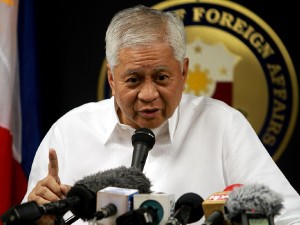MANILA, Philippines — Despite recent encounters between Chinese and Philippine vessels in the West Philippine Sea (or South China Sea), the Department of Foreign Affairs (DFA) is still hoping to nurture the good side of its ties with Beijing.
Foreign Affairs Secretary Albert del Rosario made this statement Monday in explaining the Philippine stand on the maritime dispute before seventh graders and high school students at the De La Salle Santiago Zobel in Alabang, Muntinlupa City.
“We are, in fact, committed to undertake all that is possible to cultivate positive relations with China in spite of this issue in the South China Sea/West Philippine Sea,” Del Rosario said in his speech before some 700 students, teachers and officials at the school.
The West Philippine Sea is part of the South China Sea, parts of which are in the country’s exclusive economic zone. China, meanwhile, asserts ownership over some 90 percent of the vast waters under its nine-dash line claim, rejecting partial claims of the Philippines, Vietnam, Malaysia, Brunei and Taiwan.
Del Rosario spoke just as Chinese incursions continued into the West Philippine Sea, including its expulsion of two Filipino vessels on a resupply mission to the Ayungin Shoal on Sunday and of fishing vessels at the Panatag (Scarborough) Shoal on Jan. 27.
The top diplomat reiterated that “China’s expansive nine-dash line claim has no basis in international law.”
In 2011, pending resolution to the dispute, President Aquino and then Chinese president Hu Jintao agreed to treat the maritime dispute separately from the larger picture of the bilateral ties between Manila and Beijing.
The Philippines has several times called China’s attention to this 2011 pact in responding to Chinese incursions into the West Philippine Sea.
In his speech, Del Rosario explained Philippine foreign policy to students, focusing on the defense of national territory and the extent of maritime zones under the United Nations Convention on the Law of the Sea (Unclos).
The Philippines invoked this law in filing an arbitration case against China in 2013, to nullify Beijing’s nine-dash line claim in the waters and to halt Chinese incursions into the West Philippine Sea.
He said the legal action was “last resort” for the Philippines, saying it was the way towards “a durable and lasting solution to settling the disputes.”
“Now, we go back to our question: what is the extent of Philippine territory? It is the Philippine archipelago, other lands or islands which we own and govern, such as the Kalayaan Island Group (Spratly Group of Islands) and Bajo de Masinloc (Panatag or Scarborough Shoal), and also include our maritime zones that we just discussed. All these comprise Philippine territory,” Del Rosario said, giving a rundown of China-claimed territories within the Philippines’ EEZ.
He also underscored freedom of navigation in the South China Sea, where “about 40% to 60% of world trade passes through.”
Calling the students to action, Del Rosario challenged the students to “defend what is rightfully ours.”
“This is a collective call for all Filipinos to unite as one. This is a call for you to be a patriot,” Del Rosario said.
Del Rosario has delivered the foreign policy speech for schools several times, including an engagement at the Ateneo de Manila grade school in August 2012 and at the Philippine Military Academy in November 2012.
RELATED STORY
2 PH ships driven out of Ayungin Shoal–China foreign ministry
